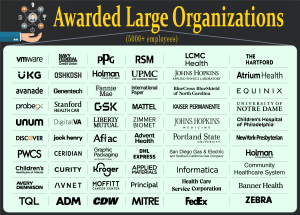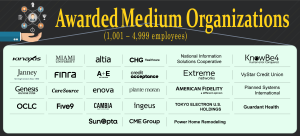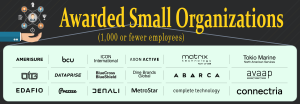Based on a strong commitment to diversity, equity, and inclusion (DEI), exceptional employee retention and engagement, adeptness in remote/hybrid work dynamics, comprehensive benefits, substantial IT career development and training programs, and significant strides in IT growth, and on the company size, Computerworld announced the best companies to work in IT 2024 list.
BY HRTech NEWS DESK:
Computerworld released the list of best companies to work in IT 2024 list. Being conscious of the impact of the company size on culture and the benefits, these companies are categorised into three categories – large, midsize and small. The enlisted companies show a strong commitment to Diversity, Equity, and Inclusion (DEI), exceptional employee retention and engagement, adeptness in remote/hybrid work dynamics, comprehensive benefits, substantial IT career development and training programs, and significant strides in IT growth.
There are a lot of qualities which make the company the best one to work with. Committing to employees’ well-being, their financial and career growth, fostering a positive and inclusive work culture, supporting and cultivating a diverse workforce, recognising and rewarding contributions and creating a healthy feedback loop contribute to the achievement of these companies. Staying true to the core value of an organisation has become crucial in today’s time of trends. With the ever-changing IT market, these organisations have successfully identified and harnessed the power of technology to grow and sustain their functions.
Hrtech Insights : Untraditional Ways to Discover Tech Talent and Promising Software Projects
The 30th annual survey conducted by Computerworld’s publisher, Foundry, aimed to recognize the top workplaces for IT professionals. Commencing in April 2023, the nomination phase welcomed entries from organisations boasting a minimum of 100 total employees, including at least five IT staff members.



The enlisted companies excelled in the following 6 categories:
DEI: DEI strategies and practices; the existence of dedicated role(s) promoting workplace diversity and inclusion; inclusion of women and minority groups within the IT workforce and within IT management; leadership accountability for DEI; DEI training opportunities.
Employee retention and engagement: Frequency of employee satisfaction surveys; promotions; salary increases; actions taken to boost employee morale.
Remote/hybrid work: Employee autonomy over work location; percentage of remote and hybrid employees; policies regarding flexible work; actions taken to support flexible work; actions taken to ensure employee safety and well-being.
Benefits: The range of benefits and perks offered, including sabbaticals, elder care and childcare, paid time off, and (within the U.S.) family leave and healthcare benefits.
IT career development and training: Mentoring programs; training budget; promotions within IT; accessibility of training to remote employees; unique training programs.
IT growth: Changes in IT headcount over the past three years; IT turnover and anticipated growth; new skills companies are planning to hire this year; outsourcing plans; the company’s revenue growth over the past three years.
When scoring the responses from the company surveys, the results were weighted against averages and benchmarks calculated within each company size group. The survey process was overseen by Jen Garofalo, research director in Foundry’s Global Services group, in collaboration with the independent firm Research Results, Inc.
Making an organisation the best to work with is a job of everyday efforts, with slow but definitive progress. We celebrate and congratulate the featured organisations.
Latest Hrtech Insights : How to Embrace Workplace Gamification Strategy?
[To share your insights with us, please write to pghosh@itechseries.com ]

